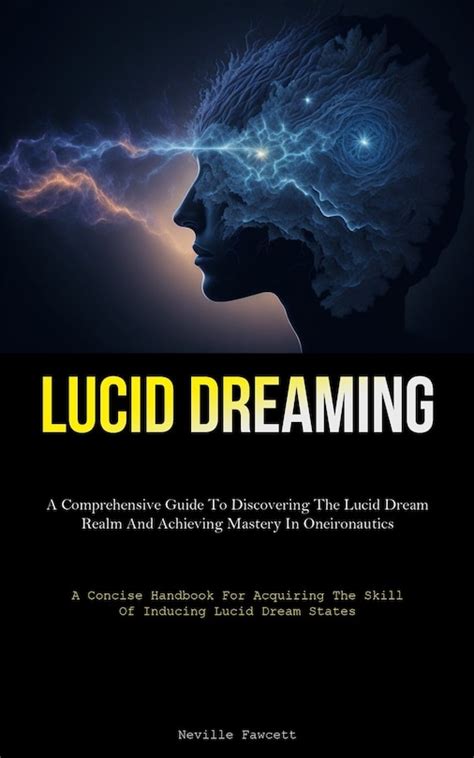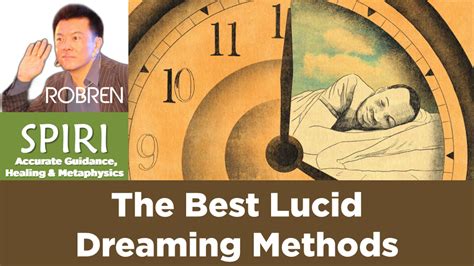In a fast-paced world where personal growth and self-improvement are highly sought-after, individuals are constantly searching for innovative ways to expand their horizons and unlock their true potential. While traditional methods such as education and professional training remain essential, there exists a unique avenue that holds immense promise – the realm of dreams.
Dreaming presents a captivating and mysterious landscape where the boundaries of reality are blurred, and the mind is free to explore uncharted territories. Through the phenomenon of lucid dreaming, individuals have the opportunity to not only experience vivid, lifelike dreams but also actively participate and influence the dream narrative. It is within this realm that an untapped potential lies, waiting to be discovered and harnessed.
Lucid dreaming acts as a powerful gateway to knowledge acquisition and personal growth. By recognizing the dream state and actively engaging with the environment, dreamers can embark on profound intellectual and emotional journeys that enhance creativity, problem-solving abilities, and self-awareness. The merging of imagination and cognition creates an extraordinary platform where ideas can flourish, limitations can be transcended, and personal development can soar to new heights.
The Science behind Lucid Dreaming and Cognitive Enhancement

Exploring the intricate connection between the human mind and dreams opens up a fascinating realm of possibilities for cognitive advancement. Lucid dreaming, a state where one becomes aware of and can control their dreams, has captivated researchers for decades. This captivating phenomenon offers a unique opportunity to merge the boundaries of consciousness and subconsciousness, providing a potential platform for accelerated learning and personal growth.
Developing Skills in Lucid Dreaming
In this section, we will explore effective techniques and strategies for enhancing your abilities to experience lucid dreams. Lucid dreaming is a state in which you become aware that you are dreaming while you are still sleeping, allowing you to consciously control and direct the events and outcomes of your dreams. By developing skills in lucid dreaming, you can tap into a world of limitless creativity, self-exploration, and personal growth.
1. Cultivate Dream Awareness:
To develop lucid dreaming skills, it is essential to start by cultivating your overall awareness of dreams. This involves paying close attention to your dream patterns, keeping a dream journal, and practicing reality checks throughout your day. By actively engaging with your dreams and increasing your awareness, you are laying the groundwork for lucid dreaming experiences.
2. Reality Checks:
Reality checks are tools used to question your reality and verify whether you are dreaming or awake. These checks can involve simple actions like looking at a clock or reading a sentence twice to check for consistency. By regularly performing reality checks, you will train your mind to carry out these actions in your dreams as well, increasing the likelihood of becoming lucid.
3. Mnemonic Induction of Lucid Dreams (MILD):
MILD is a technique that involves setting intentions and affirmations for lucid dreaming before sleep. As you lay in bed, repeat a phrase or mantra such as "I will have a lucid dream tonight" and visualize yourself becoming aware in a dream. By consistently practicing MILD, you can condition your mind to increase the chances of having a lucid dream.
4. Wake-Initiated Lucid Dreams (WILD):
WILD is a technique that involves transitioning directly from a state of wakefulness into a dream while maintaining full lucidity. This technique requires a high level of concentration and can be achieved through methods such as meditation, visualization, and maintaining awareness during the transitions between wakefulness and sleep.
5. Enhancing Dream Recall:
Improving your ability to recall dreams is crucial for developing lucid dreaming skills. Keep a dream journal by your bedside and write down any details or impressions immediately after waking up. This practice helps to strengthen your dream recall abilities and provides valuable insights into your dream patterns, which can aid in achieving lucidity.
6. Explore Lucid Dreaming Supplements:
There are certain supplements, such as vitamin B6, that have been linked to increased dream vividness and improved dream recall. Before incorporating any supplements into your routine, it is essential to consult with a healthcare professional to ensure they are safe for you.
By incorporating these techniques into your routine and dedicating time and effort to practice them consistently, you can develop the skills necessary to unlock the hidden potential of lucid dreaming. With lucid dreaming, you can delve into a realm of endless possibilities and use your dreams as a powerful tool for personal growth and self-discovery.
Techniques for Acquiring New Skills during Lucid Dreams

The realm of lucid dreams presents a remarkable opportunity to expand our knowledge and capabilities by acquiring new skills. In this section, we will delve into various techniques that can be employed to effectively learn and develop skills while consciously aware in the dream world.
One technique involves visualizing yourself performing the desired skill with utmost precision and mastery. By harnessing the power of intention and imagination, you can mentally rehearse the sequence of movements or actions required, ingraining them deeply in your subconscious mind. This process enhances neural connections related to the skill and facilitates its acquisition in both the dream and waking states.
Another approach is to seek out dream characters who possess expertise in the skill you wish to acquire. Engaging with these characters allows you to directly learn from their knowledge and proficiency. Interacting with and observing their techniques can provide valuable insights and inspiration, helping you refine your own understanding and execution of the skill.
Lucid dreams also offer an opportunity to break free from the limitations of the physical world and explore the boundaries of what is possible. During these dreams, you can experiment with and push the boundaries of a desired skill, testing different strategies and approaches without fear of failure or consequence. This freedom allows for accelerated learning and a deeper understanding of the skill's intricacies.
Additionally, utilizing mnemonic techniques within lucid dreams can enhance the retention of newly acquired information. By associating the skill with vivid sensory experiences, employing memory palaces, or creating mnemonic devices, you can strengthen the encoding and retrieval process, making the skill more easily transferable to your waking life.
Lucid dreams can serve as a rich playground for learning and honing new skills. By utilizing techniques like visualization, learning from dream characters, pushing boundaries, and employing mnemonic devices, you have the potential to unlock profound growth and development in various areas of expertise. Embrace the power of lucid dreaming to unlock your boundless potential for acquiring new skills.
Real-life Examples of Successful Learning in Lucid Dreams
Exploring the realm of lucid dreaming opens up a world of unlimited possibilities, where individuals can tap into their subconscious mind, gain new knowledge, and enhance their learning abilities. In this section, we will delve into real-life experiences that demonstrate the power of learning in lucid dreams.
1. Creative Problem Solving: Lucid dreaming provides a unique platform for individuals to creatively solve complex problems. Take the example of a struggling artist who, in a lucid dream, visualizes and experiments with different artistic techniques, leading to breakthroughs in their work once they awaken.
2. Learning New Skills: Lucid dreams can serve as a powerful training ground for acquiring new skills. Imagine an aspiring musician who harnesses the potential of lucid dreaming to practice playing various musical instruments, improving techniques, and ultimately excelling in their craft.
3. Gaining Deep Insights: Lucid dreams have the ability to unlock profound insights and understanding. For instance, a scientist working on a complex research problem may find answers and innovative ideas by exploring concepts and theories within their lucid dreams.
4. Overcoming Fears and Phobias: Lucid dreaming offers a safe environment to confront and conquer fears. Individuals suffering from phobias or anxieties can deliberately create lucid dreams to face their fears, gradually desensitizing themselves and facilitating personal growth.
5. Enhancing Memory and Retention: Lucid dreams have the potential to improve memory and enhance information retention. Students can utilize lucid dreaming techniques to review and consolidate their learning materials, leading to better academic performance and knowledge retention.
6. Practicing Public Speaking: Lucid dreaming can be a valuable tool for practicing public speaking and overcoming stage fright. Individuals can simulate presenting in front of a large audience, refining their delivery and building confidence in their communication skills.
7. Exploring Historical or Fictional Worlds: Lucid dreaming allows individuals to immerse themselves in historical or fictional worlds, providing a rich and vivid learning experience. Whether it is exploring ancient civilizations or engaging with beloved fictional characters, lucid dreams offer a unique opportunity for learning and imagination.
In conclusion, these real-life examples highlight the immense potential of learning in lucid dreams. By harnessing the power of lucidity and tapping into our subconscious mind, we can achieve remarkable learning outcomes and unlock new horizons of knowledge and personal growth.
Combining Lucid Dreaming with Traditional Learning Methods for Optimal Results

Exploring the synergy between conscious dreaming and conventional educational approaches, this section delves into the potential benefits of merging the power of lucid dreaming with established learning techniques. By incorporating elements of lucid dreaming into our educational journey, we can unlock new avenues of creativity, enhance memory retention, and deepen our understanding of complex subjects.
FAQ
Are dreams important for learning?
Yes, dreams play a crucial role in the learning process. While we sleep and dream, our brain is actively processing information, making connections, and consolidating memories. These processes enhance our overall learning and cognitive abilities.
How can dreaming help unlock our potential?
Dreaming can help unlock our potential by providing a platform for creativity, problem-solving, and self-reflection. During dreams, our minds are free from the constraints of reality, allowing us to explore new ideas, visualize our goals, and confront challenges in a unique way that can lead to personal growth.
Is lucid dreaming a useful technique for learning?
Yes, lucid dreaming can be a valuable technique for learning. Lucid dreaming is when you become aware that you are dreaming while still in the dream state. This awareness opens up opportunities for intentional learning and personal development, as you can actively engage with the dream environment and consciously explore specific topics or skills you wish to improve.
Can dreaming help improve our memory?
Absolutely! Dreaming helps improve our memory by serving as a memory consolidation process. During Rapid Eye Movement (REM) sleep, which is when most dreaming occurs, our brains consolidate and integrate newly acquired information into our long-term memory storage. This can enhance our ability to retain and recall information, ultimately improving our overall memory.




